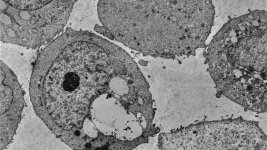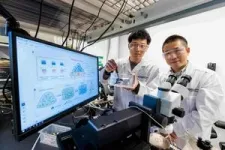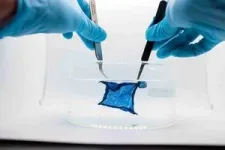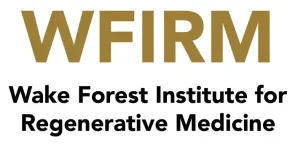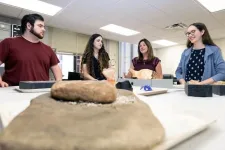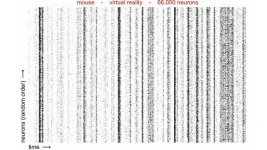(Press-News.org) Prostate cancer is a quiet killer. In most men, it’s treatable. However, in some cases, it resists all known therapies and turns extremely deadly. A new discovery at Cold Spring Harbor Laboratory (CSHL) points to a potentially groundbreaking solution. CSHL Professor Lloyd Trotman’s lab has found that the pro-oxidant supplement menadione slows prostate cancer progression in mice. The supplement is a precursor to vitamin K, commonly found in leafy greens. The story begins more than two decades ago.
In 2001, the National Cancer Institute’s SELECT trial sought to determine if an antioxidant vitamin E supplement could successfully treat or prevent prostate cancer. The trial involving 35,000 men was planned to last up to 12 years. However, after just three years, participants were told to stop taking their supplements. Not only had vitamin E failed to slow or prevent prostate cancer—more men taking the supplement started to get the disease. Seeing these results, Trotman thought, ‘If an antioxidant failed, maybe a pro-oxidant would work.’ His new findings in mice show just that.
When mice with prostate cancer are given menadione, it messes with the cancer’s survival processes. Trotman’s team has discovered that menadione kills prostate cancer cells by depleting a lipid called PI(3)P, which works like an ID tag. Without it, the cells stop recycling incoming materials and eventually explode.
“It’s like a transport hub, like JFK. If everything that goes in is immediately de-identified, nobody knows where the airplanes should go next. New stuff keeps coming in, and the hub starts to swell. This ultimately leads to the cell bursting," explains Trotman.
This causes the cancer’s progression to slow significantly in mice. Trotman now hopes to see the experiment translated to pilot studies in human prostate cancer patients:
“Our target group would be men who get biopsies and have an early form of the disease diagnosed. We wonder if they start to take the supplement, whether we would be able to slow that disease down.”
Amazingly, Trotman’s research suggests menadione may also prove effective against myotubular myopathy, a rare condition that prevents muscle growth in infant boys. Those diagnosed rarely live beyond early childhood. Trotman’s lab has found that depleting PI(3)P with menadione can double the lifespan of mice with this condition.
If the results hold up in humans, it would mean that men with prostate cancer can enjoy a better quality of life and more time with their families. It could also mean more precious time for children born with an incurable disease.
END
Vitamin K supplement slows prostate cancer in mice
2024-10-24
ELSE PRESS RELEASES FROM THIS DATE:
Wildfires are becoming faster and more dangerous in the Western U.S.
2024-10-24
Fast-growing fires were responsible for nearly 90 percent of fire-related damages despite being relatively rare in the United States between 2001-2020, according to a new study led by the University of Colorado Boulder. “Fast fires,” which thrust embers into the air ahead of rapidly advancing flames, can ignite homes before emergency responders are able to intervene. The work, published today in Science, shows these fires are getting faster in the Western U.S., increasing the risk for millions of people.
The research highlights a critical gap in hazard preparedness across the U.S. — National-level ...
Gut bacteria transfer genes to disable weapons of their competitors
2024-10-24
Bacteria evolve rapidly in the human gut by sharing genetic elements with each other. Bacteriodales is a prolific order of gut bacteria that trade hundreds of genetic elements. Little is known, however, about the effects of these DNA transfers, either to the fitness of the bacteria or the host.
New research from the University of Chicago shows that a large, ubiquitous mobile genetic element changes the antagonistic weaponry of Bacteroides fragilis, a common bacterium of the human gut. Acquisition of this element shuts down a potent weapon ...
A new hydrogel semiconductor represents a breakthrough for tissue-interfaced bioelectronics
2024-10-24
The ideal material for interfacing electronics with living tissue is soft, stretchable, and just as water-loving as the tissue itself—in short, a hydrogel. Semiconductors, the key materials for bioelectronics such as pacemakers, biosensors, and drug delivery devices, on the other hand, are rigid, brittle, and water-hating, impossible to dissolve in the way hydrogels have traditionally been built.
A paper published today in Science from the UChicago Pritzker School of Molecular Engineering (PME) has solved this challenge that has long ...
Bird study finds sons help their parents less than daughters because they’re scouting future prospects
2024-10-24
Male birds help their parents less than females because they’re too busy scouting for new places to live and breed, a remarkable new study shows.
The study, led by researchers at the Centre for Ecology and Conservation at the University of Exeter, examined the cooperative behaviour and movement patterns of social birds called white-browed sparrow weavers, which live in the Kalahari desert.
These birds live in family groups in which only a dominant pair breeds – and their grown-up offspring, particularly females, help ...
Wake Forest Institute for Regenerative Medicine (WFIRM) awarded up to $48 million to utilize body-on-a-chip technologies to study fibrosis-inducing chemical injuries
2024-10-24
The Wake Forest Institute for Regenerative Medicine (WFIRM) has been awarded an eight-year contract, valued up to $48 million from the U.S. Department of Health and Human Services (HHS) to support the utilization of cutting-edge body-on-a-chip technologies aimed at studying and developing potential treatments for sulfur mustard and other fibrosis-inducing chemicals. The program has been approved with an initial contracting commitment of approximately $18 million.
This contract represents a continued partnership between WFIRM and the Biomedical Advanced Research and Development Authority (BARDA), ...
Study offers ‘compelling evidence’ for continuous stroke care improvement
2024-10-24
Research Highlights:
A retrospective look at Get With The Guidelines® – Stroke registry data from 2003 to 2022 finds substantial and sustained improvements in acute stroke care among those in the quality improvement program.
Researchers found increased adherence to evidence-based stroke care translates to better clinical outcomes and, ultimately, more patients being discharged home or to a skilled nursing facility more quickly.
Overall, authors say the positive trends suggest concerted quality improvement initiatives can improve ...
Professor awarded NEH grant to advance anthropology research collections at Texas A&M
2024-10-24
Dr. Katie Custer Bojakowski, an instructional assistant professor in the Department of Anthropology at Texas A&M University and the director and curator of its Anthropology Research Collections (ARC), has been awarded a Preservation Assistance Grant from the National Endowment for the Humanities (NEH).
The NEH’s Preservation Assistance Grants program helps organizations protect their collections of historical and cultural items, making sure they remain available for students, scholars and the public. These grants help address risks to these collections, ...
New tool helps scientists spot patterns in mountains of data
2024-10-24
Neuroscientists have learned a lot – like which neurons and circuits are associated with different behaviors – by recording the activity of small sets of neurons.
But what happens when you record thousands of neurons at one time? Or when you want to figure out the role of neurons when there isn’t an obvious external catalyst or you’re not sure what you’re even looking for?
That’s where Rastermap comes in.
The new visualization tool developed by the Stringer and Pachitariu labs at HHMI's Janelia Research Campus helps ...
Glomerular filtration rate changes following UTI in children with vesicoureteral reflux
2024-10-24
About The Study: This cohort study uses data from the Children With Vesicoureteral Reflux trial to assess estimated glomerular filtration rate (eGFR) changes in participants with vs without recurrent urinary tract infections.
Corresponding Author: To contact the corresponding author, David S. Hains, MD, MBA, email dhains@iu.edu.
To access the embargoed study: Visit our For The Media website at this link https://media.jamanetwork.com/
(doi:10.1001/jamapediatrics.2024.4546)
Editor’s Note: Please see the article for additional information, including other authors, author contributions ...
Dandelion-shaped supernova and zombie star
2024-10-24
In 1181, a new star shone near the Cassiopeia constellation for six months before disappearing. This event, recorded as a “guest star” by Chinese and Japanese observers almost a millennium ago, has puzzled astronomers for centuries. It is one of a few supernovae to be documented before the invention of telescopes. In addition, it remained an “orphan” the longest, meaning that none of the celestial objects visible today could be assigned to it. Now known as the supernova SN 1181, its remnant has only been traced in 2021 to the nebula ...
